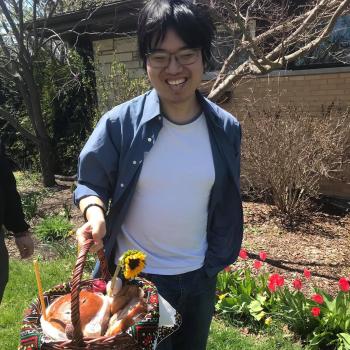
Over the past week or so, I’ve been trying to work through what I think of the recent abuse crisis in the Latin Church. I did so because I have a blog, and what one does on such platforms is to work through one’s own thinking. The objective is to muddle through to clarity. I am flattered that some people called my ramblings ‘articles.’ Articles have coherence, even a modicum of authority. Blog posts are still in a state of process. They are tentative, and in my view, any pretension otherwise is to betray the genre. They are invitations to readers to think with me. The good ones even pray for me.
This current post is to take stock of where I am so far. Part of why I feel I have to do this is because it seems that my writing has generated some conversation for me, both online and off. It is clear to me that some people are sorting themselves into different ideological camps from me, including people that I love, respect, and trust, and I want to be critical enough of myself to see how I arrived at the conclusions I have and then have the nerve to discern whether I still agree with myself and at least some of them. Much of this thinking is still in progress, so think of this post as a progress report.
I’ve tried to retain some of that tentativeness in my writing, though I am not sure how successful I’ve been. At this point, I have three pieces:
- Nothing surprises me any more – until it does: reflections on the Pennsylvania grand jury report and bishops’ conferences
- I know a priest who is gay
- It’s only as good as we practice it: clarifying my Greek Catholic thoughts on the sex abuse crisis
The main question I had for myself from the outset was – why was I so fascinated by the crisis? I am Catholic, after all, but not in the Latin Church. The problematic bishops and pervert priests in question this time are not in the Kyivan Church. I am also not an abuse victim, and as someone thoughtfully commented on my social media, he detected that there was some uneasiness in not writing from a position of identifying as a victim. The feeling I have is also not really anger, shock, or dismay because, as I said, nothing surprises me anymore, but I found my personal detachment curious and a little disturbing in light of the outburst of anger at the current situation, if I am to be honest, and wanted to explore it more.
As I wrote, I processed, which is why the first piece turned out to be over 6,000 words. I learned a few things about myself, the most significant of which was that since I am not an abuse victim, I don’t write like one. Instead, I am someone whose been trained to be a church company man, and then since I saw way too much in the evangelical churches and Anglican parishes in which I worked and helped my dad write a dissertation on pastoral sexual misconduct in which he had to read plenty about the Catholic Church, I wrote a bit more like I was watching a mystery novel unfold. That explained the detachment.
Then I had to put together what I thought the evidence was pointing to. It seemed to me, upon reading the grand jury report from Pennsylvania, that the real problem was not just that the bishops were moving pedophile priests around, but that they knew that they were covering it up and doing it anyway. The prime example of this phenomenon was Cardinal Wuerl. The grand jury report demonstrates with documentation that he knew that he was criminally liable when he moved the priests around, and still, he allowed a priest with known ties to a child pornography ring to transfer to the Diocese of Reno-Las Vegas, and then to the Archdiocese of Los Angeles, the provenance of another archbishop who knew what he was doing and was doing it anyway, Cardinal Mahony.
At this point, I came to see the larger problem, which was that the phenomenon of bishops helping each other out seemed to be institutionalized in national and regional bishops’ conferences. While these institutions have some illustrious histories – including in the birth of the liberation theology I’ve come to appreciate so much in the Latin American bishops’ conference, arguably one of the first of its kind and a model of more to come – they seem to have crystallized into a kind of ideological structure in the Francis pontificate. Certainly, there has been a trajectory of fostering bishops’ conferences since the pontificate of Paul VI (whom Francis seems determined to imitate, given his frequent quotations of Evangelii Nuntiandi), but under Francis, they’ve taken on a kind of magisterial role in their own right. In a positive sense, Francis demonstrates his collegiality with them when he peppers his encyclicals and exhortations with quotations from them. But his Vatican outfit has also pursued the consolidation of the bishops’ conferences seemingly at all costs, such as in their nearly disastrous attempt to invent one for the People’s Republic of China, and the real irony seems to be that the current blowback concerns corruption within bishops’ conferences in Chile and the United States (and God knows how many more). It turns out, as I said, that all the talk about the competing ideologies of centralizing authority in the Vatican and decentralizing to the bishops’ conferences is just a smokescreen because they result in the same de facto structure for the Latin Church: it is a church consisting solely of the hierarchy, some of whom are in Rome and others of which are in the local bishops’ conferences. Even the most progressive version of this structure, which consolidates power in the local bishops’ conferences, is a church without people, which is terribly awkward given the Latin Church’s official position since the Second Vatican Council that the Church actually consists of the people of God.
With this in mind, I proposed that the solution to this problem is to adopt a Byzantine liturgical polity of sorts. I described those practices as democratic. The Byzantine liturgies, after all, feature the self-organization of the people as into singers, cantors, readers, and servers. The priests and bishops, meanwhile, are usually too busy with their own prayers behind the iconostas. The deacons come between the altar and the sanctuary, but they could be hardly called liturgical leaders. If anything, it is the people who lead themselves, and this liturgical praxis – which is not always done well in Orthodox churches whether in communion with Rome or not – models how our churches should be structured. The people have agency, and the people, as I said in that first post, should enact what is called in our church a Revolution of Dignity, taking to the streets because they are not about to be taken for fools and the bishops as their shepherds coming with them.
This solution, I learned as I wrote, generated several problems for me. The first is that this meant that I was sorting myself into a camp, which are entities that I don’t like to be part of. In broad strokes, I am an advocate for changes in the Latin Church that involve the lay people as the people of God in a serious way, instead of having a church effectively composed of bishops who cover for each other. However, I do not agree with everyone in this camp. Perhaps the most prominent piece of writing with which I disagree is the petition going around soliciting signatures from Catholic educators calling for the American bishops to resign en masse. After reading the statement, I find myself unable to sign it. The memory of the Chilean bishops resigning so as to put the ball in Pope Francis’s court as to whose resignations to accept is still far too fresh for me. The impulse behind the gesture is, I am sure, a genuine one, but it also strikes me as ignorantly American. I would like the laity to win, not to find themselves having acted on impulse and finding themselves playing the bishops’ careerist games all over again.
In other words, I do not support efforts to reform the institution as a structure. All I’d like to see are the practices of polity change. I don’t support reformist moves because I am lacking in what might be called a liberal impulse. Proposals for reform seem to be born of the consensus of the laity, but they emphasize far too much a kind of ultimate faith that the institutions that they are in will do the right thing. Perhaps my conservative impulses are showing, but I do not share this institutional faith, and my inability to sign this document probably indicates that of all the words to use for my political positions, liberal is probably not one of them. The qualification I’ll add, though, is that I do study publics, so I would also not be surprised to discover in myself vectors of sympathy for liberalism, so I also do not think of myself as illiberal either. I am much more in favor of the ecclesial revolution that is advocated by the theologian Adam DeVille. In DeVille’s view, the problem with the Latin Church is that it insists that its authoritarian structure is the way to be Catholic. There are many other modes of Catholicism, though, many of which include the laity, such as Anglican and Byzantine ways of church governance. But these are not reforms. These are avenues for réssourcement into the very meaning of Catholicism, getting to the roots – the radix – of the Catholic churches. Like DeVille, I am not a liberal. I hope to become more radical.
The second problem is that I might be accused of deviating from what some people think is the real topic at hand: sex. Some people I have been talking to really want me to see that there has been what the late Fr Andrew Greeley called a lavender mafia in the Latin Church, especially incidents where the sexualization of bodies has been openly flaunted and celebrated. This is a position that I also associate with First Things, a publication of which I am quite critical because it has served as a platform for a kind of Catholic neoconservatism that is problematically colonizing in its own right, including in Eastern Europe. I saw some public statements also push this line, including that of Bishop Robert Morlino’s, and wondered to myself whether there was a link between neoconservative ideology and this almost total association between a sexualizing cabal and the personal sexuality of priests, but as usual when it comes to these kinds of things, there doesn’t seem to be a neat link between ideology, network, and sexual orientation. In fact, as a politically conservative interlocutor of mine recently pointed out to me, it is also a little distasteful to call everything that appears liberal conservative and hawkish neoconservative, especially because there are many kinds of conservatisms. Indeed, Morlino’s statement struck me as different in tone from First Things, so I wonder whether there are many conservatisms at work in this camp.
Yet I am also considering that some of the folks talking to me are not really politically conservative, but have observed a kind of practical dishonesty in the Latin Church about sexuality that drives a wedge between teaching and praxis. For them, the lavender mafia does not really refer to ‘human traffickers,’ as I have been saying, but priests and bishops and their enablers who obscure church teaching while counseling others to break it in practice. Pushing for integration does not strike me as a conservative impulse, as the point of conservatism is usually to preserve or restore some kind of nostalgic order that might shape the psyche. In this sense, this last group of people is neither conservative nor even motivated by homophobia; they just want consistency. However, the cabal in this sense also did not seem to me to link neatly the priests and bishops who may themselves be gay and the inconsistent praxis of teaching; the syndicate in this sense are the people who purport to teach Catholic moral theology but actually do not, regardless of their personal experience of sexuality.
The convergence of all these people in what I’m calling the lavender mafia camp – folks who seem to me to be neoconservative, other people who are conservative in other ways, and finally those who just want consistency in Catholic sexual praxis – has led me to consider what conservatism actually is, not that I have not considered this question before. However, these thoughts became so irrelevant to the abuse crisis that I shelved them. I bring up this trajectory of thinking, though, because it is the path that considering how the lavender mafia explanation of the crisis brought me down. I am not sure how my thinking about conservatism here is going to shake out, but I found the tidy association of gay priests and a cabal, however constituted, a little bit problematic. Working through this camp’s thinking, the one point that I could agree with them on was that there does seem to be a network of enablers for clergy sex abuse, and probably for other nefarious things too, but I am not as certain as them as to how it is constituted. I also realize that my thinking cannot be considered conservative, despite my conservative upbringing.
Thinking through all this led me down the path of writing a post on a gay priest friend that I have. He and those living with him in the same community house might be described as part of a liberal wing of the Latin Church. However, they were also your run-of-the-mill pro-life, anti-abortion, celibate Catholic priests too who were as into Evelyn Waugh and Flannery O’Connor as every other Catholic intellectual out there. Being gay, I learned from him and his housemates, was an experience of the world that was more than being attracted to persons of the same sex as oneself. This phenomenon, I learned, went hand in hand with seeking to be integrated within oneself instead of operating out of a place of disintegration, which leads to more than rape – it usually includes alcoholism among the clergy too. It struck me that being gay and being part of a ‘lavender mafia’ were two entirely separate things. An experience of the world while being a gay man does not seem to me even as a straight, married man who is not an abuse victim to be associated with the practice of human trafficking, which is what the cabal in the Latin Church of fostering pedophilia and pederasty was really about. In other words, I considered that it really was possible to be gay, be faithful to the teaching of the Church, and to not be a human trafficker. I’ve met real people who meet all three criteria.
A final camp of people seem to be saying that changing the structure of the Church will not solve the problem of clergy sex abuse and human trafficking. For them, the proposal to let the lay people have a hand in governing the Catholic churches amounts to changing the meaning of Catholicism and the priesthood. They reason that this will lead to several problems, the first of which is that bishops are technically the signs of communion across episcopal sees, so without bishops, there is no Catholicism. The second is that it seems that it was not so much that the teachings of the Latin Church about the priesthood were the problem, nor even ‘clericalism’ in the sense of saying that there is something special about being a priest or a bishop, but that the priests and bishops actively behaved in faithless ways toward church teaching and rationalized away their sins as acceptable.
I gave this final group of people some thought, and when I decided that I could understand their objections enough, I wrote a clarifying post about what I meant when I advocated a democratic Byzantine polity. I agree with them insofar as changing structures – or heavens, teaching – will not lead to the resolution of the crisis. This is because the problem is not systems; it is, as they might agree, practices. In this way, when I talk about Byzantine liturgical praxis, I too am talking about practices because they are only good enough as we practice them. In fact, I argue that a disordered relationship between any church and the Latin Church, whether by envying them or irrationally hating them, is a recipe for disaster because it distracts from the necessary practices, not ideologies, that will lead to solving the crisis. The crisis, as I said, is that the bishops’ conferences are behaving as syndicates to cover up sex abuse. The solution, I propose, is that the people of God should have the agency to organize in protection of themselves, which includes being able to report these perverts to the police without fear that they are doing damage to the Church. They are, in fact, healing the Church when they do this, and this, I mused, is one of the only times I’d be caught dead advocating this kind of symphonia between attorney generals and the people of God.
In writing through this mess, I’ve learned some things about the current public discussion about the abuse crisis. It took a process of conscientization for me to come to a position that I agreed with: that the people of God should get to know all the facts of the crisis and decide which of the bishops gets to stay or go, in an effort to undo the Latin Church’s ecclesial practice of making the church exclusively about the hierarchy. I came to this conclusion based on the information in the Pennsylvania grand jury report. In voicing my views, I then understood that there was a further process of conscientization to undergo, which included dialogue with the various schools of thought that have formed around this issue. While I probably have sorted myself into a camp, I have learned that most people speaking on the crisis have something to say too. I’ve been trying to take them seriously, and so have further refined my position with more posts. In this way, I wrote myself to greater clarity, and I write now to say that I am enjoying this ongoing development of my own consciousness about my consciousness and hope therefore to continue writing in this conscientious way.
















